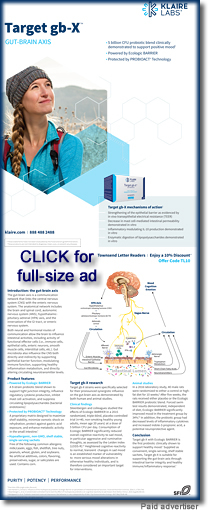Page 1, 2
Endocannabinoid System Burdens
A number of factors can interfere with the proper functioning of the endocannabinoid system, throwing the body out of homeostasis. For example, obesity is associated with an over activated endocannabinoid system in adult subjects.28 Moreover, offspring of female rodents that consumed a high-fat diet during pregnancy were obese with fat cell hypertrophy and buildup of lipids in brown adipose tissue.29 These effects correlated with alterations in the endocannabinoid system of the rat pups. In male offspring of mothers fed a high-fat diet, CB1 and CB2 receptor levels declined in subcutaneous adipose tissue. In female offspring of mothers fed a high-fat diet, visceral CB1 levels increased while subcutaneous concentrations decreased. CB1 concentrations increased in brown adipose tissue from both male and female offspring of mothers that consumed the high-fat diet.
Toxins can serve as another disrupter of the endocannabinoid system. For example, the mechanism by which BPA causes fatty liver is thought to involve up-regulation of the endocannabinoid system.30
 An imbalance of the gut microbiota known as dysbiosis is another threat to the optimal functioning of the endocannabinoid system. A rodent study found that dysbiosis of the gut microbiota led to changes in the endocannabinoid system.31 In this study, researchers administered antimicrobials to mice for two weeks in order to cause dysbiosis. Afterward, the animals were given 109 CFU/day of Lactobacillus casei DG or a placebo for up to a week. Antimicrobial administration resulted in dysbiosis of the microbiota. At the same time, there was a general inflammatory state and changes in some aspects of the endocannabinoid system in the gut. These changes were accompanied by behavioral alterations, including increased immobility in the tail suspension test (an indicator of depression), as well as biochemical and functional changes in the brain such as neuronal firing in the hippocampus and rearrangements of non-neuronal cells in brain regions controlling emotional behavior. Probiotic intake eliminated most of these changes. An imbalance of the gut microbiota known as dysbiosis is another threat to the optimal functioning of the endocannabinoid system. A rodent study found that dysbiosis of the gut microbiota led to changes in the endocannabinoid system.31 In this study, researchers administered antimicrobials to mice for two weeks in order to cause dysbiosis. Afterward, the animals were given 109 CFU/day of Lactobacillus casei DG or a placebo for up to a week. Antimicrobial administration resulted in dysbiosis of the microbiota. At the same time, there was a general inflammatory state and changes in some aspects of the endocannabinoid system in the gut. These changes were accompanied by behavioral alterations, including increased immobility in the tail suspension test (an indicator of depression), as well as biochemical and functional changes in the brain such as neuronal firing in the hippocampus and rearrangements of non-neuronal cells in brain regions controlling emotional behavior. Probiotic intake eliminated most of these changes.
Sex Hormones and Cannabinoids
The association between the endocannabinoid system and estrogen indicates that declining estrogen levels with menopause may disrupt this system. The endocannabinoid system has an under-recognized role in male and female health. Cannabinoids and sex hormones influence common molecular pathways involved in cell proliferation.32 Furthermore, estrogen plays an important role in the endocannabinoid system expression in the female reproductive tract.12 Administering the estrogen estradiol to ovariectomized rats caused a marked increase in CB1, CB2, the anandamide-degrading enzyme fatty acid amide hydrolase (FAAH), and COX-2 expression.12 These effects were estrogen-receptor dependent. Anandamide levels also increased in the plasma after estradiol treatment. According to the study authors, "Thus, estradiol may have a direct regulatory role in the modulation of ECS [the endocannabinoid system] in female reproductive tissues."
These findings may explain anecdotal reports of CBD oil reducing hot flashes and other symptoms of surgically induced menopause in women.
Endocannabinoid Imbalance and Psychological Stress
One characteristic of an imbalanced endocannabinoid system is the inability to cope with stress.33-35 That's why this system is often dysfunctional in people with post-traumatic stress disorder. Stimulation of the endocannabinoid system inhibits the activation of the hypothalamus-pituitary-adrenal axis that occurs after stress.33-35 In this way, this system helps us recover from anxious experiences and brings us back to homeostasis. In male rodents, when the CB1 receptor is blocked, it takes longer for the HPA axis to recover from stress.36
Significant concentrations of nitric oxide (NO) are found in the brain and adrenal glands and NO may be involved in the stress response. During stress, anandamide suppresses the activity of the nitric oxide synthase enzyme, indicating that endocannabinoids may reduce stress by inhibiting the generation of NO in the hypothalamus and adrenals.37
An impaired endocannabinoid system may also be one of the reasons why stress impacts gastrointestinal function.38 The endocannabinoid system in the gastrointestinal tract regulates motility, secretion, sensation, emesis, satiety, and inflammation. It also influences visceral sensation.
Beyond stress, there are many other consequences of a dysfunctional endocannabinoid system including pain, cognitive dysfunction, depression, epilepsy, and more. We will discuss some of these in further detail in this article while we will address others in next month's issue of Townsend Letter.
Improving Endocannabinoid System Function with Cannabinoid-Rich Hemp Oil
Cannabinoid-rich hemp oil is an ideal choice to optimize the endocannabinoid system. Throughout the remainder of this article and the next part of this article we will discuss the justification for using hemp oil in a variety of clinical applications. The primary cannabinoid in hemp oil is CBD. However, it also contains other phytocannabinoids as well as terpenes, which work with CBD to support endocannabinoid system function and therefore make hemp oil uniquely suited to enhance areas of health regulated by the endocannabinoid system. The entourage effect – sometimes called the "hemptourage effect" – refers to the ability of other more minor components of hemp oil such as the terpenes to support the activity of its main player, CBD. For example, the terpenes limonene, pinene, and linalool can provide a complementary action to CBD's cognitive-enhancing abilities by improving mood.39 Pinene is also known to enhance mental clarity, thus acting synergistically to CBD.39 The entourage effect is a fascinating aspect of cannabinoid therapy, and Dr. Chris Meletis explores this effect in more detail in the ICCT medical certification program.
Like so many herbals that are popularly used around the world, hemp has been employed for centuries with many health benefits. The moment we start eliminating certain constituents we may lose certain therapeutic benefits often attributed to the entourage or hemptourage effect. Yet, even with that said, we still don't fully know all the effects of the cannabinoids and terpenes either as standalone substances or in concert.
Cannabinoid-Rich Hemp Oil and Pain Control
As noted earlier, various receptors in the endocannabinoid system are involved in the regulation of pain including CB1, CB2, and TRPV1. Pain is a common complaint among patients as evidenced by the fact sales of opioid drugs almost quadrupled from 1999 to 2014.40 CB2 indirectly activates opioid receptors, thus blocking painful stimuli.41 In part through this mechanism, cannabinoids reduce inflammatory and neuropathic pain, which are notoriously difficult to successfully treat.42 Animal models, human studies, and experience from clinical practice indicate that cannabinoid-rich hemp oil or CBD are useful in various types of pain. In a rodent model of osteoarthritis, CBD administered locally to the area surrounding the joint reduced the initial inflammatory response and thus subsequent pain and inflammation.43 Furthermore, cannabinoid-rich hemp oil reduced body pain and improved other symptoms in girls who had an adverse reaction to the human papillomavirus (HPV) vaccine.44 Other evidence indicates the oil of cannabis seeds reduces pain in patients with chronic musculoskeletal inflammation, an effect attributed to the ideal omega-3/omega-6 ratio content.45
Treating pain properly involves addressing more than just physical discomfort. Pain is a multidimensional problem that also encompasses impairments in mood, cognition, and function. This is one way where management of pain with opioids goes wrong as opioids can actually worsen all of these components of pain. Phytocannabinoids found in hemp oil, on the other hand, can improve all of these accompanying mental health factors as we will discuss in the next part of this article.
Proper Dosing Is Crucial
Before concluding this article, we want to caution that it is important to keep in mind proper dosing protocols when employing cannabinoid-rich hemp oil. CBD is less potent than THC and much higher doses may be needed for its beneficial effects on pain and inflammation. At the same time, it's crucial not to over activate the endocannabinoid system as scientists at the ICCT have found that overdosing on CBD can worsen certain conditions such as epilepsy. It's best to begin dosing at modest levels and then increase the dose slowly over two weeks.
Diligent education and a conservative approach to dose for each individual patient and the patient pool in general needs to be in the forefront of the prescriber. As Dr. Meletis has shared in the classroom setting as an associate professor of natural pharmacology, if a natural substance is strong enough to nudge a biochemical pathway towards optimized homeostasis, it also holds the potential to disturb homeostasis when not employed judiciously. Keeping up with the rapidly growing and burgeoning research field on hemp is critical. This is one reason why Dr. Meletis applauded the ICCT when they decided to create their certification programs. The medical certification program is a more precise way to establish the proper dose by using established ICCT protocols.
We also recommend that healthcare practitioners seek out hemp-oil manufacturers who are recommending the use of products that have been certified by the ICCT so as to avoid hemp oil products that may have contaminants or overly high concentrations of THC.
Conclusion
From long before birth, our bodies are dependent upon the homeostasis provided by the endocannabinoid system, which casts a wide net over various aspects of health including pain management and control of psychological stress, among many others. The endocannabinoid system functions through the activation of a number of receptors. Endocannabinoids as well as phytocannabinoids such as those found in hemp oil interact with these receptors. Consequently, supporting the function of the endocannabinoid system is an under-recognized way to enhance virtually every aspect of health.
Page 1, 2
Part Three is also online
Part One is also online
References .pdf
Dr. Chris D. Meletis is an educator, international author, and lecturer. His personal mission is "Changing America's Health One Person at a Time." He believes that when people become educated about their bodies, that is the moment when true change and wellness begins. Dr. Meletis served as dean of naturopathic medicine and chief medical officer for 7 years at National College of Natural Medicine (NCNM) and was awarded the 2003 Physician of the Year award by the American Association of Naturopathic Physicians.
www.DrMeletis.com
Kimberly Wilkes is a freelance writer specializing in health, science, nutrition, and complementary medicine. She has written more than 300 articles covering a variety of topics from the dangers of homocysteine to sugar's damaging effects on the heart. She is the editor of ProThera ® Inc.'s practitioner newsletter and enjoys scouring the medical literature to find the latest health-related science. |
![]()
![]()
![]()
![]()






